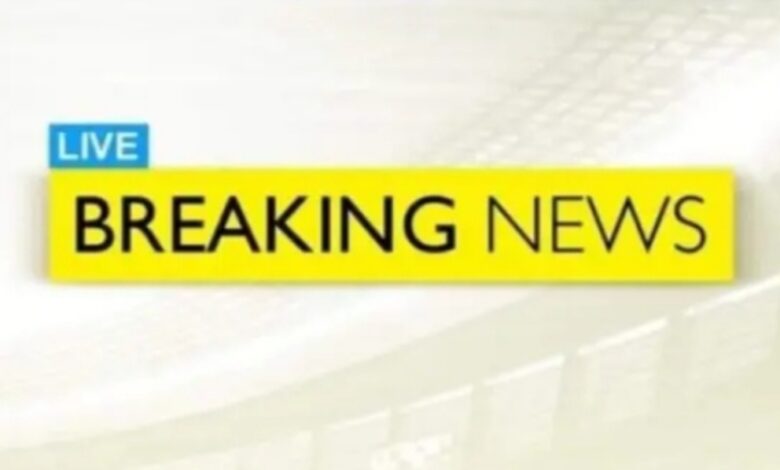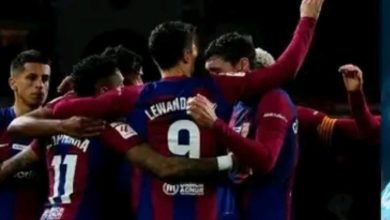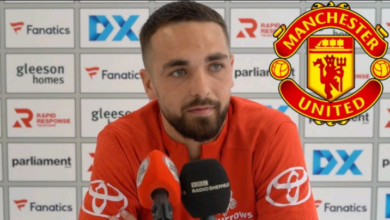
In a recent interview, FC Barcelona’s rising defensive talent, Pau Cubarsí, shared his deep admiration for Atlético Madrid’s prolific striker, Julián Álvarez. The young defender, when asked about which player he would most like to see join Barcelona, did not hesitate to name the Argentine forward as his ideal signing. His endorsement of Álvarez speaks volumes, given Cubarsí’s own rapid rise within the club and his growing influence in the footballing world.
At just 18 years old, Cubarsí has made significant strides in his career, progressing through the esteemed La Masia academy to earn a coveted place in Barcelona’s first team. His exceptional defensive abilities, composed demeanor under pressure, and keen tactical awareness have already drawn comparisons to some of the club’s legendary center-backs. As a result, his opinions on potential player acquisitions carry substantial weight, both among devoted Barcelona fans and seasoned football analysts.
Julián Álvarez, who currently plays for Atlético Madrid, has been nothing short of a revelation in Spain’s top league. Since making the transition from Manchester City, he has demonstrated remarkable versatility, lethal finishing, and an unrelenting work ethic—qualities that have cemented his status as one of the most sought-after forwards in European football. His ability to adapt to different attacking roles while maintaining a high level of efficiency makes him a formidable opponent for defenders across La Liga.
Cubarsí’s endorsement of Álvarez is rooted in the striker’s extraordinary ability to change the course of a match almost single-handedly. Álvarez possesses an innate talent for positioning himself in dangerous areas, combined with sharp agility and an eye for goal, which consistently trouble even the most disciplined defenses. For a club like Barcelona, where fluidity in attack and seamless positional interchangeability are fundamental principles, a forward of Álvarez’s caliber would be a significant asset.
Beyond merely appreciating Álvarez’s technical skills, Cubarsí’s statement also reflects a broader vision for Barcelona’s future squad composition. The club has historically combined its homegrown talents with strategic external signings to maintain its competitive edge, both in domestic competitions and on the European stage. Álvarez, with his dynamic attacking prowess and adaptability, fits this philosophy perfectly, making him an enticing prospect for the club’s long-term ambitions.
However, despite the appeal of acquiring a player of Álvarez’s quality, several obstacles stand in the way of such a move. Firstly, Atlético Madrid is unlikely to willingly part with a player who has quickly become a crucial element of their attacking strategy. The club, known for its resilience both on and off the pitch, would undoubtedly resist any attempts from a direct rival to lure away one of their prized assets. Furthermore, the long-standing rivalry between Barcelona and Atlético adds another layer of complexity to any potential negotiations, making an amicable transfer highly improbable.
Financial constraints also pose a significant challenge for Barcelona. In recent years, the club has faced economic difficulties that have forced it to adopt a more cautious approach to spending. While there is no doubt that Álvarez would enhance their attacking options, the financial investment required to secure his signature might be too steep, given Barcelona’s current fiscal realities. This situation necessitates careful financial planning, as the club must weigh the benefits of signing a high-profile forward against the need to maintain financial stability.
Nevertheless, Cubarsí’s admiration for Álvarez is a testament to the impact the Argentine forward has had in La Liga and the growing respect he commands from fellow professionals. When a young defender of Cubarsí’s stature publicly acknowledges an opposing striker as a dream signing, it speaks to the high regard in which Álvarez is held within the footballing community.
This exchange of recognition between players from rival teams also underscores the mutual respect that exists in top-tier football. Despite the fierce competition, elite footballers appreciate and acknowledge the talent of their peers, fostering a culture of respect even amid intense rivalries.
For Barcelona supporters, Cubarsí’s comments may ignite discussions about the club’s future transfer strategies and the direction they should take in strengthening their squad. While the immediate feasibility of signing Álvarez remains uncertain, his name being mentioned in this context sparks conversations about the club’s ambitions, squad-building approach, and long-term goals.
Cubarsí’s remarks also offer insight into the key attributes Barcelona values in potential recruits. Versatility, technical proficiency, and a mentality aligned with the club’s storied philosophy are essential qualities for any incoming player. Álvarez embodies all of these traits, making him an ideal—though challenging—target for the Catalan giants.
In conclusion, Pau Cubarsí’s enthusiastic endorsement of Julián Álvarez as a potential addition to FC Barcelona provides valuable insight into the young defender’s footballing intelligence and vision for the club’s future. While the practicalities of such a transfer remain complex, his admiration for Álvarez highlights the striker’s growing influence and impact in European football.
As both players continue their respective journeys in La Liga, their performances will be closely watched by fans and analysts alike. Many may even imagine a scenario where these two promising talents eventually find themselves on the same team. Until that day comes, Cubarsí’s statement stands as a fascinating point of discussion regarding Barcelona’s future direction and the intricate, ever-evolving nature of player transfers in modern football.




